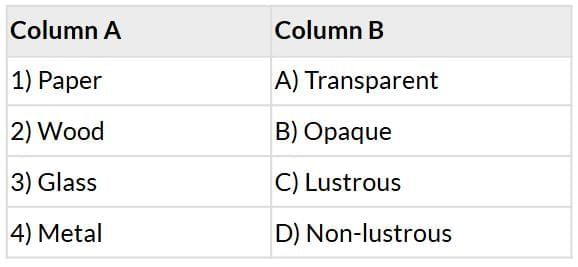Worksheet: Materials Around Us - 1 | Worksheets with Solutions for Class 6 PDF Download
| Table of contents |

|
| Multiple Choice Questions (MCQs) |

|
| Fill in the Blanks |

|
| True or False |

|
| Match the Following |

|
Multiple Choice Questions (MCQs)
Q1: Which of the following materials is used for making windows?
(a) Wood
(b) Plastic
(c) Glass
(d) Metal
Q2: What is the property of materials that determines whether they can be compressed?
(a) Hardness
(b) Solubility
(c) Lustrous
(d) Density
Q3: Which of the following materials is classified as non-lustrous?
(a) Copper
(b) Paper
(c) Aluminum
(d) Gold
Q4: Which material can be described as opaque?
(a) Water
(b) Glass
(c) Wood
(d) Air
Q5: In which state of matter does the material have a defined volume but no defined shape?
(a) Solid
(b) Liquid
(c) Gas
(d) Plasma
Fill in the Blanks
Q1: Materials that allow light to pass through are called __________.
Q2: The process of arranging materials or objects based on common properties is called __________.
Q3: __________ materials do not dissolve in water.
Q4: The unit of mass in the International System of Units (SI) is __________.
Q5: A common property of metals is that they are usually __________.
True or False
Q1: All shiny materials are metals.
Q2: Wood is an example of a transparent material.
Q3: Plastic can be used to make a variety of objects.
Q4: Lustrous materials can lose their shine when exposed to air.
Q5: The volume of a liquid is usually measured in grams.
Match the Following
Q. Match the items in Column A with the correct option in Column B.
You can access the solutions to this worksheet here.
FAQs on Worksheet: Materials Around Us - 1 - Worksheets with Solutions for Class 6
| 1. What are the different types of materials around us? |  |
| 2. How can we identify materials based on their properties? |  |
| 3. What is the significance of classifying materials into natural and synthetic? |  |
| 4. Can you give examples of materials that change states? |  |
| 5. Why is it important to study the materials around us? |  |





















